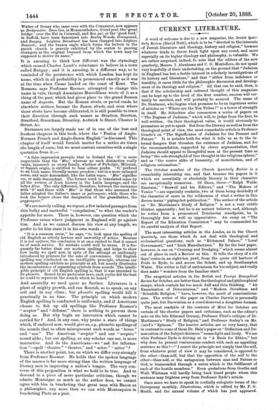CURRENT LITERATURE.
A word of welcome is due to a new magazine, the Jewish Quar- terly Review (David Nutt), which is to be "devoted to the interests of Jewish literature and theology, history and religion," because whatever tends to throw fresh light upon any creed, and more especially on its higher theology and philosophy, is valuable. We are rather surprised, indeed, fo note that the editors of the new quarterly, Messrs. I. Abrahams and C. G. Montefiore, do not speak very hopefully of their undertaking, on the ground that "Judaism in England has but a feeble interest in scholarly investigations of its history and literature," and that "either from indolence or timidity, it cares little for the philosophic discussion and develop- ment of its theology and religion." All that can be said, then, is that if the scholarship .and cultured thought of this magazine can be kept up to the level of the first number, success will cer- tainly be merited, and will probably be assured. The name of Dr. Neubauer, who begins what promises to be an ingenious series of articles on "Where are the Ten Tribes ?" is a tower of strength in itself. Mr. Schechter also commences a series of papers on "The Dogmas of Judaism," which will, to judge from the first, be well written. On their theological value, it would obviously be premature as yet to speak. But from the literary as well as from the theological point of view, the most remarkable article is Professor Graetz's on "The Significance of Judaism for the Present and Future." It is notable both for what it tells us as to the in- ternal dangers that threaten the existence of Judaism, and for the recommendation, supported by clever argumentation, that Judaism should appeal to thoughtful men at the present time as being "the sole stronghold of free thought in the religious sphere," and as "the source alike of humanity, of monotheism, and of religious rationalism."


































 Previous page
Previous page